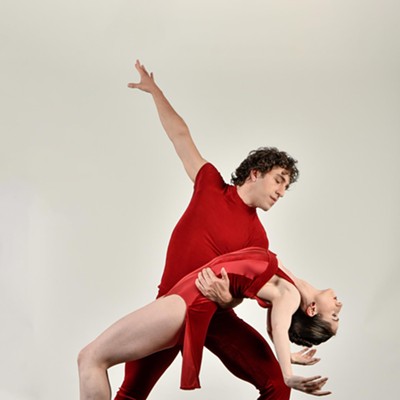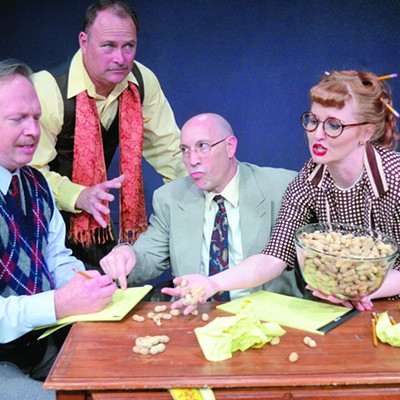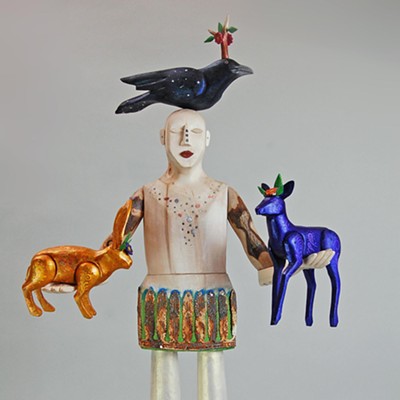In lieu of lyrics, liner notes for his 2006 solo release, Mobile, offer instructive context and, in the process, provide a short course in percussion theory that winds up giving fans more than a little insight into Wilco music as well.
Kotche says, "I thought about not putting that in there, because I didn't want it to be too academic. That's why most of the dates on this tour are in rock clubs. I don't want it to be taken too seriously. I have played museums and festivals and things like that, but I want your average rock fan to be able to enjoy it."
Kotche's solo performances make it clear how much influence the drummer has wielded since 2002's Yankee Hotel Foxtrot, his first recording with Wilco, and add to the anticipation around the band's May 2007 release, Sky Blue Sky. Perhaps more importantly, they reveal a talent for composing and arranging that matches Kotche's command of just about every instrument in the percussion family.
Mobile music rings and chatters, pops and rumbles, dangles, spins and skitters across an abstract, upbeat world of light and shadows. Over eight tracks, Kotche exposes, unencumbered, the sensibility that has contributed such unique textures to projects like Loose Fur, with Wilco's Jeff Tweedy and jazz-pop avatar Jim O'Rourke, and earlier work by Edith Frost, Chris Mills and Paul K and the Weathermen.
A graduate of the percussion program at the University of Kentucky, Kotche says, "I knew that by going into that program, I'd learn a lot and become a much better player, but part of it was also my parents insisting I get a college degree. I just wanted to play in a rock band, (but) I realized that all of the things I learned in college could be an asset to my playing and expand it a little more.
"Since I trained on all that stuff, I figured, well, hey, these are interesting sounds, and I might as well use them. So I started incorporating a lot of that, and that's when Jim O'Rourke took notice, and Jeff Tweedy."
Kotche's longstanding ardor for playing in rock bands (he's pursued that course since he was 15) isn't a bit diminished by the satisfactions of his solo work. "I think the two really help inform each other. There are obviously rhythmic explorations and sound explorations that I can do solo that wouldn't be appropriate for me to do with Wilco, just because for me, Wilco's about Jeff's lyrics. That should be the focus when he's singing; that's what we're there to help illustrate.
"When I'm doing the solo stuff ... there's more freedom to incorporate different ideas, but I'm trying to make it interesting for a listener for an hour, so I have to think a lot about the role that each instrument plays in the development of each song and the evolution of the set."
Asked whether his solo work might be unprecedented in popular music, he responds, "I guess there's more in the classical world. Max Neuhaus had a couple of solo percussion records, and Steve Schick, but what I'm trying to do more is keep it within the context of the drum set. One person who comes to mind is Terry Bozzio who played in (Frank) Zappa's band, but his solo performances are more about soloing and improvising, where I'm doing a little more structure and trying to play actual songs."
Kotche is also a big fan of John Convertino's piano-based solo project, Ragland. "He's always been really inspiring to me, from Giant Sand days and even the stuff he did with Richard Buckner, and, of course, Calexico. His playing is very musical. I think he's just a great listener. He's very aware of the lyric and what's happening in the music and what the focus should be, and he knows just how to complement it to help illustrate it. I guess that's what I've learned from his playing."
It's not that Kotche is daunted by more formal opportunities. Mobile includes a track, "Clapping Music Variations," on which he performs 12 percussion parts he arranged for an adaptation of a work by minimalist Steve Reich. He'll conduct a percussion ensemble performing the work at Elmhurst College in late spring; it's already been performed by ensembles at the University of Kentucky and Central Michigan University.
Kotche says "Variations" is too complex to perform live, so audiences are treated to another Reich piece, "Music for Pieces of Wood." His live set also includes two new songs and a João Gilberto cover in addition to other music from Mobile, notably the lovely, Zimbabwean-influenced vibraphone solo, "Fantasy on a Shona Theme."
"Some of it is just flat-out acoustic me," he says. "Some of it, I have effects on the drums, but they're still being played in real time. A couple of tunes, I play with MiniDiscs like a backing track, so it's more of a duet with myself, pre-recorded."
In the latter category is a stunning set piece based on a traditional Balinese performance art known as the Monkey Chant, which has its roots in a love-and-war story from the Hindu sacred text, the Ramayana, and an ancient Balinese ritual for exorcism. The Monkey Chant is an almost incomprehensibly intricate, polyrhythmic vocal performance typically involving 100 or so actors chanting like a monkey army while others perform the roles of characters in the story.
Kotche's version, clocking in at around 15 minutes, not only mimics the sounds but tells the story. "I heard a recording of the Monkey Chant, and I was just drawn to it. I started imitating some of it on the drum set, and imitating some of the melodies, then I realized that different sounds on the snare drum (a particular snare of his own creation) could play the parts of some of the characters in the story. So I researched the story and assigned five or six unique sounds to be the five or six main characters. The way the sounds interact, it's actually following the narrative. I use looping where one event is carrying on while another event is starting."
If all this seems pretty geeky for a rock musician, Kotche brings things down to earth when asked about his favorite drummers. "You can throw John Bonham (Led Zeppelin) out there," he says, "and Levon Helm (The Band). And Ringo. Don't forget Ringo."












